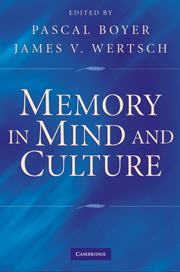Book contents
- Frontmatter
- Contents
- List of Contributors
- PART I IN MIND, CULTURE, AND HISTORY: A SPECIAL PERSPECTIVE
- 1 What Are Memories For? Functions of Recall in Cognition and Culture
- PART II HOW DO MEMORIES CONSTRUCT OUR PAST?
- PART III HOW DO WE BUILD SHARED COLLECTIVE MEMORIES?
- PART IV HOW DOES MEMORY SHAPE HISTORY?
- PART V HOW DOES MEMORY SHAPE CULTURE?
- Index
- References
1 - What Are Memories For? Functions of Recall in Cognition and Culture
Published online by Cambridge University Press: 05 June 2012
- Frontmatter
- Contents
- List of Contributors
- PART I IN MIND, CULTURE, AND HISTORY: A SPECIAL PERSPECTIVE
- 1 What Are Memories For? Functions of Recall in Cognition and Culture
- PART II HOW DO MEMORIES CONSTRUCT OUR PAST?
- PART III HOW DO WE BUILD SHARED COLLECTIVE MEMORIES?
- PART IV HOW DOES MEMORY SHAPE HISTORY?
- PART V HOW DOES MEMORY SHAPE CULTURE?
- Index
- References
Summary
What is memory for? The easy and spontaneous answer is that “memory is for storing information about the past,” “memory helps us preserve past events,” and variations on that theme. But what is the point of that? Why should any organism have that kind of a capacity? What good is it? Surprisingly, this is not a topic that has received much attention from specialists of memory. There are, of course, many models and accounts of memory in psychology, but they generally focus on the internal workings of the organ, as it were, rather than its function in relation to the rest of human behavior. So it makes sense to ask, what does memory actually do? If we follow an organism around and try to understand its behavior, can we say that some of that behavior is influenced by memory? When? How? Perhaps, as we form a better idea of what memory does, we will be able to make more informed guesses about what memory is for and how it came to be.
MEMORY IS FOR THE PRESENT – SO WHY MEMORIES?
Obviously, we have memory because of evolution, because of the kinds of organisms we are, as a consequence of our evolutionary history. Now the past does not affect an organism, except through its consequences for present circumstances. So if we consider memory as a biological function, we are led to consider that memory is certainly not about the past but about present and future behavior.
Information
- Type
- Chapter
- Information
- Memory in Mind and Culture , pp. 3 - 28Publisher: Cambridge University PressPrint publication year: 2009
References
Accessibility standard: Unknown
Why this information is here
This section outlines the accessibility features of this content - including support for screen readers, full keyboard navigation and high-contrast display options. This may not be relevant for you.Accessibility Information
- 36
- Cited by
